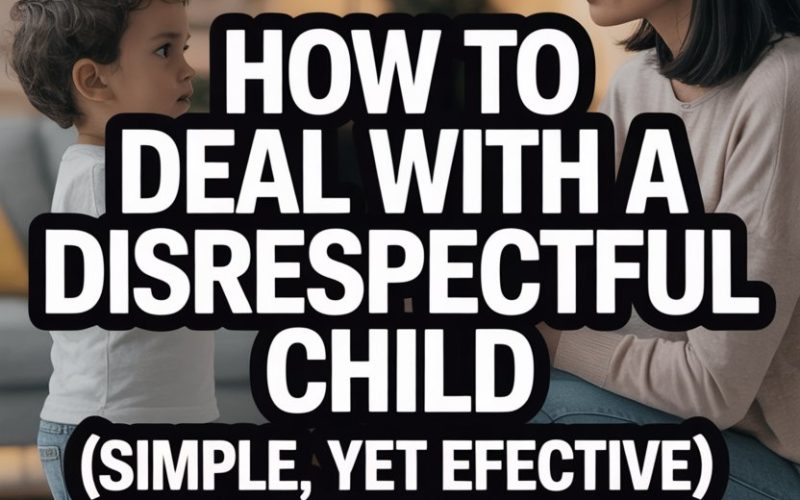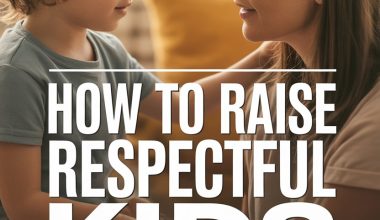Every parent has a moment where they stare at their child—possibly mid-eye roll, arms crossed, mumbling under their breath—and think, “Who swapped my sweet baby with this tiny, moody teenager?”
If you’ve recently been on the receiving end of a sassy comeback or a door slammed with just a hint too much enthusiasm, you’re not alone.
Disrespectful behaviour can make even the calmest parent consider hiding in the pantry with the good biscuits.
Before you start Googling “boarding schools on remote islands,” let’s talk about what actually works.
Spoiler alert: It usually isn’t yelling, bribing, or threatening to take away every electronic device in a five-mile radius.
Spot the Triggers
No child is born with the skills of a soap opera diva. Disrespectful behaviour often bubbles up from somewhere.
Maybe it’s a tough day at school. Maybe it’s a change at home. Maybe the Wi-Fi is down and TikTok is unreachable.
Watch for patterns. Does your child get mouthy when they’re hungry, tired, or feeling ignored? Are there certain times of day or situations that seem to bring out their inner gremlin?
Pinpointing these triggers can help you get ahead of the drama and respond with empathy—before your child morphs into a walking, talking eye roll.
Stay Calm and Breathe
Easier said than done, right? When disrespect comes at you like a freight train, instincts might urge you to shout back, lecture, or get sarcastic.
Fight those urges. Deep breath. Channel your inner Zen master (or fake it—your secret’s safe with me).
Responding in a calm, even voice serves two purposes: It keeps you in control, and it models exactly how you want your child to behave.
According to research on emotional regulation in parenting, kids are more likely to mirror your emotions than your words. So give them something worth copying.
Set Clear Boundaries and Stick to Them
Children thrive on knowing where the limits are—even if testing those limits is their unofficial hobby. Let your child know what is and isn’t okay in your house. “It’s fine to be upset, but it’s not okay to speak to me like that.” Simple, firm, and non-negotiable.
Consistency is the magic ingredient. If disrespectful behaviour gets ignored one day and punished the next, kids get confused.
Mixed messages breed more mischief. Stand firm, even if it means repeating yourself more times than you ever thought possible.
Ditch the Power Struggles
Every parent has fallen into this trap at least once: The back-and-forth argument that goes nowhere fast.
The louder they get, the firmer you get, until everyone’s blood pressure is through the roof and nothing’s been achieved besides frayed nerves.
Instead of arguing, keep responses short and neutral. “I hear that you’re upset. We can talk when you’re ready to be respectful.” Then walk away. This lets your child save face and gives them the space to cool down.
Spoiler: It also saves your sanity.
Model Respect (Even When You’re Fuming)
Respect isn’t a one-way street. When children feel respected, they’re more likely to reciprocate—even if it takes a while (and some days, it really takes a while).
Use polite language. Listen as much as you talk. Apologise when you’re wrong. Treating your child with dignity, even during a spat, lays the groundwork for a more respectful relationship.
According to child psychologist Laura Markham, consistently modelling respect is one of the most powerful ways to teach it.
Hand Out Consequences, Not Punishments
There’s a difference—and it matters. Punishments tend to be reactionary and sometimes a little random (“No telly for a week!”), while consequences are logical and tied to the behaviour.
If your child speaks rudely, a logical consequence might be pausing the conversation until they can speak respectfully—or taking a break from an activity they’re enjoying. Keep it relevant and fair.
Children are more likely to get the message if the consequence actually connects to the behaviour.
Catch Them Being Good
Even the snarkiest kid has shining moments of kindness and cooperation, though they might be rarer than a matching pair of socks in the laundry. When you spot respectful behaviour, acknowledge it. “Thanks for speaking to me politely just now.”
Positive reinforcement isn’t just for puppies. According to behavioural science research, children repeat behaviours that get them attention—especially positive attention. A little praise can work wonders.
Pick Your Battles
If you try to correct every single eye roll or muttered “whatever,” you’ll wear yourself out faster than a battery-powered toy on Christmas morning. Some snark is just noise; some is a sign of bigger problems.
Ask yourself: Is this behaviour genuinely disrespectful, or just irritating? Is your child pushing boundaries in a normal, age-appropriate way?
Save your energy for the moments that really matter. Not every squabble needs a life lesson attached.
Give Choices and Offer Some Control
Kids and teens are miniature control freaks. (Aren’t we all?) When children feel powerless, disrespect often spikes. Handing them small choices—what to wear, which snack to eat, when to do their reading—can go a long way.
When you give children a sense of control over their world, they’re less likely to fight for it in less pleasant ways. For example, “You can come to dinner now or in five minutes—your choice.”
Suddenly, you’re not the dictator, you’re the benevolent leader. Who doesn’t love a promotion?
Reconnect After the Storm
Disrespectful moments feel personal, but they rarely are. Children lash out because they’re overwhelmed, upset, or just plain human. Once things have cooled down, make space for reconnection.
This might mean a quiet chat, a shared joke, or just sitting together. If an apology is needed—from you or your child—offer it up.
Repairing the relationship is just as important as correcting the behaviour. It signals to your child, “I love you, even when you’re acting like a porcupine in a tutu.”
When to Seek Extra Help
If disrespect is constant, extreme, or making daily life unbearable, it’s worth reaching out to someone with professional expertise. Family therapists, school counsellors, and paediatricians have seen it all and can help untangle more complex issues.
Sometimes, what seems like defiance is a sign of anxiety, depression, ADHD, or other challenges.
If your gut says something bigger might be at play, trust it and get support from a qualified expert, such as those found through the Child Mind Institute.
Patience, Progress, and Plenty of Tea
Raising a child isn’t for the faint-hearted. Disrespectful behaviour doesn’t disappear overnight, even with all the sensible strategies and gentle reminders in the world. There will be setbacks and probably a few more slammed doors.
Progress is measured in tiny moments: a conversation that ends with a smile instead of a sigh, a closed mouth instead of a comeback.
On the rough days, remind yourself: every parent faces this challenge at some point. You’re not alone, you’re not failing, and you’re not raising a lost cause.
Chin up, kettle on, and keep going—you’ve absolutely got this.




